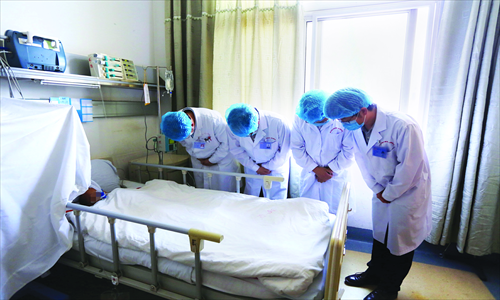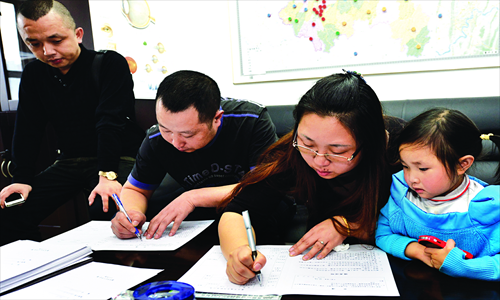HOME >> CHINA
Transplant reform
By Liu Dong Source:Global Times Published: 2013-12-15 19:23:01

Doctors pay tribute to the body of 8-year-old organ donor Dandan in Kunming, Yunnan Province, on May 22. Photo: CFP
Just a month ago, Xia Qiang, a surgeon from Shanghai Renji Hospital, and his team made history by completing the first two transplant operations using organs donated by residents in the city.Such operations are taking place with increasing frequency across China, showing a determination to move from sourcing organs from executed prisoners to acquiring organs from citizens willing to donate.
China is the top country in the world in terms of carrying out organ transplants as well as for having the most patients waiting for transplants. According to official figures from Chinese health authorities, more than 1.3 million patients wait for organ transplants each year while only 10,000 are lucky enough to get one. The rest try their luck in the underground black market.
Prior to 2010, the majority of Chinese organ transplants came from executed prisoners, prompting criticism from the international community.
Hangzhou Resolution
At an organ transplant congress held by Chinese health authorities in early November in Hangzhou, Zhejiang Province, Huang Jiefu, former vice minister of the Ministry of Health and director of the China Organ Transplant Committee (OTC), announced that China was undertaking reform of the organ transplant system. Its aim was to build an organ donation and transplant system that fits China's actual conditions as well as the principles of the World Health Organization.
"We will strive to promote voluntary donation among citizens to gradually reduce dependence on executed prisoners," Huang said, according to news portal caixin.com.
A total of 169 hospitals nationwide approved by China's health authority to carry out organ transplants signed a document entitled the "Hangzhou Resolution" at the conference.
It stipulated that all organ transplants must strictly abide by related laws and regulations and all organ sources must comply with medical ethics and the principle of voluntary donation.
To prevent organ trading and abuse of power due to the scarcity of organs, the health authority released a human organ donation acquisition and distribution management regulation in August that required all 169 qualified organ transplant hospitals to use the China Organ Transplant Response System (COTRS).
"We require that all organ transplant hospitals ensure an open, fair and transparent organ harvesting and distribution process," Huang said.
According to the Red Cross Society of China, by the end of October this year 1,161 Chinese citizens donated 3,175 organs, saving more than 3,000 lives since the country launched the pilot donation project in 2010.
However, most of these cases were distributed in certain provinces such as Guangdong, Zhejiang, Shaanxi, Hunan and Hubei while other provinces and major cities including Beijing and Shanghai, where demand was greatest, saw barely any impact.
The project has now been widely promoted across the nation. Just 20 days after the regulation was implemented in August, Shanghai carried out its very first successful organ donation and transplant case after applying the COTRS system.
"The situation has begun to change. This is a promising start. Although small and still facing many difficulties, it has significant meaning," said Xia Qiang.

Hu Hongbo (left 2nd) and his wife sign to donate organs of their 10-year-old daughter Hu Yuqing at a hospital in Chongqing on April 8. Photo: CFP
Fair distribution
"The donor, who died of a sudden severe cerebral vascular accident, originally wanted to give his kidney to his son who was suffering from chronic kidney failure. However, we found their blood type didn't match, so the transplant couldn't be done. After we talked with the family, they agreed to donate his liver and kidneys to save other people," Fu told the Global Times.
After getting permission from all of the donor's immediate family members, the hospital began making preparations without delay.
According to Fu, the process involves getting several levels of confirmation, including from clinicians, the chief physician and an expert team from other hospitals as well as a discussion held by the hospital's ethics committee before the doctors are eventually authorized to harvest the organs.
After acquiring the organs, the organ donation information is immediately entered into COTRS by the Red Cross Society.
The system will then name five first-round transplant candidates from the registered patients waiting list based on the state of illness, matching situation, waiting time and proximity.
The system then sends a notice to the contacts of the five patients in their hospitals. The decision is then made for the most suitable person within an hour of the feedback being received.
Finally, a 29-year-old man with end-stage uremia and a 39-year-old patient with hepatocellular carcinoma at Fu's hospital as well as another 49-year-old man from another hospital in Shanghai with end-stage uremia received the kidney and liver transplants.
"We waited for a long time but there was no donor. If we didn't have this chance, my husband would have died of a massive hemorrhage. Our whole family really thanks the donor and his family," one of the recipients told Shanghai Dragon Television.
After going through a similar acquisition and distribution process, Xia's hospital accepted two organ donations in September and November. One of them was the very first child donation case in Shanghai, and the organs saved four lives.
Difficulties and challenges
Although China's organ donation project has made a good start, it still lags far behind the official goal, which is to end the dependence on organs from condemned prisoners in two years.
"Many people, even some medical staff, do not understand why we have to do organ donation and transplant work," Tang Zhaoxiang, deputy director of the Human Organ Donation Shanghai Office, told the Global Times.
"In fact, organ transplants are one of the most cutting-edge clinical research topics. The level of Chinese transplants is not low, but the international community did not recognize us mainly because of the controversial death row donor source. We encourage citizens to donate to accord with international practice," Tang said.
"And a more pragmatic reason is that many people who cannot receive organ transplants consume a large amount of medical resources in the long term. It is a heavy burden for both patients and their families as well as society, but transplants could prevent this and do good for all," Tang stated.
But Tang acknowledges that although human organ donation work has much room for improvement in China considering the huge demand, it also faces great challenges due to the idea of organ donation being traditionally seen as taboo.
Tang did some simple math to highlight the problem. Shanghai currently has 17 hospitals qualified to conduct organ transplants. Each hospital has, on average, 30 ICU beds, and each bed can hold at least one donor every year. So even under the most conservative calculations, Shanghai theoretically can produce hundreds of donors every year, while the reality is very different.
"The biggest obstacle was people's low awareness and acceptance of organ donation. Most Chinese people have a traditional concept of respecting the dead, which makes it very difficult to persuade the family of the deceased to think about donating when they are in a state of grief," Zhang Peifang, transplant donation coordinator at Changzheng Hospital, told the Global Times.
"Even some of our colleagues in the emergency room did not want us to put organ donation promotional materials in the emergency room," Zhang added.
There are currently only some 30 organ donation coordinators like Zhang in Shanghai. Their main duty is to find potential organ donors and guide their families if they express a willingness to donate.
Identifying standards of death is another difficulty. According to Tang, China currently does not have any legal standards and regulations to define criteria for death.
"Chinese people have a major misunderstanding on standards of death. Medically speaking, brain death is the most scientific criteria as opposed to cardiac death. People who don't have a heartbeat are not necessarily dead since they can also maintain vital signs through a ventilator and drugs. But brain death is real death," Tang said.
To manage these misconceptions, Chinese health authorities announced three kinds of criteria for death: brain death (BD), cardiac death (CD) and donation after brain death plus cardiac death (DBCD), which means turning off life support and waiting until the heart stops after the doctor confirms the donor has suffered brain death.
In practice, BD is the most ideal condition for transplants, but many hospitals only use DBCD, which avoids possible conflicts but also lowers the quality of the organs. In fact, Tang said China applies a very strict standard on brain death.
Doctors can only confirm brain death when at least two of three criteria are met: the disappearance of spontaneous breathing, lack of brain wave activity, and lack of brain stem reflexes.
"But even some medical staff working on the front line may not understand the criteria clearly," Fu from Changzheng Hospital said.
However, Xia from Renji Hospital believes that strict brain death standards are a bottom line that must be adhered to. "Otherwise, the consequences could be terrible," he said.
Xia also believes that another reason for the low success rate of organ donations in China is that many hospitals without qualifications for organ transplant are indifferent to the issue.
"Some hospitals even oppose their doctors being involved in transplants to avoid trouble," Xia said.
As a liver transplant specialist, Xia says he has seen too many despairing patients die because there are no organs available.
"The waiting list of patients actually is not as long as many people think because most of them don't have much time. If they can't wait for a donor, they will die," he said.
Posted in: In-Depth